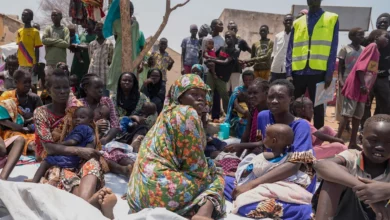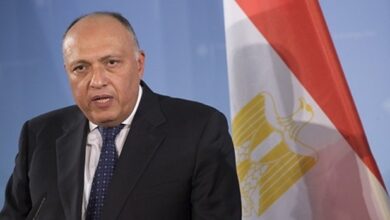The entry of armed forces from Saudi Arabia and the United Arab Emirates into Bahrain, where protests demanding democratic reforms are taking place, threatens to trigger a civil war in the country, said the Cairo Institute for Human Rights Studies on Wednesday.
In a press statement, the rights group accused the Arab League and the United States of collusion with regards to the entry of the GCC forces into Baharain, where they aim to crack down on the Bahraini people's movement for democratic reform.
The Institute said the Bahraini army and police forces, supported by the Saudi and UAE armed forces, began on Wednesday to expand "the brutal suppression of the legitimate aspirations of the Bahraini people towards profound political and constitutional reforms."
The Bahraini forces on Wednesday forcefully dispersed protesters in Manama who had been camped out for days at the Pearl Roundabout. Troops also surrounded several hospitals to prevent injured people from accessing medical treatment.
The Bahraini opposition said at least five protesters were killed. The protesters are demanding a new constitution that would move the country toward democracy, as well as the resignation of the prime minister, who was appointed in 1971.
The Institute also referred to "unconfirmed information" from Bahrain on the involvement of the Saudi security forces in “acts of oppression in Manama”. The Bahraini authorities approved the entry of Saudi and UAE troops to Bahrain under the pretext of ensuring stability and maintaining security in light of the turmoil facing the country. They also announced a three-month state of emergency.
According to the Institute, the participation of troops from the three Gulf countries, all of which are governed by Sunni families, threatens to turn the Shia-dominated Bahrain into a "blood bath in which gross violations of human rights and international humanitarian law are committed, similar to the violations and brutal crimes being committed by the Libyan regime against its people."
“Saudi Arabia was very concerned about the pro-democracy revolutions that erupted in Tunisia and Egypt, as they threaten its autocratic system,” said the group.
“Therefore, it moved on to its line of attack in Bahrain, as the success of the popular uprising in neighboring Bahrain would offer direct support to the advocates of reform in Saudi Arabia, and especially for the legitimate demands of the oppressed Shia minority,” said the group.
Saudi Arabia has been hosting ousted Tunisian President Zine al-Abidine Ben Ali, despite government demands that he be extradited to the Tunisian authorities for a fair trial. Furthermore, during the Egyptian revolution, the Saudi government expressed its support for ousted Egyptian President Hosni Mubarak and said it would welcome Mubarak after he stepped down on 11 February.
The rights group called upon the Arab League to oppose the Saudi and UAE intervention in Bahrain, demanding that the League support the democratic aspirations of the Bahraini protesters.
The group also urged the United States — which has a naval base in Bahrain — to take "appropriate stances and decisions that will prevent the transformation of Bahrain into an arena for settling regional accounts, which will encourage Iran to intervene under the pretext of supporting the oppressed Shia majority in Bahrain.”
The United States had announced that sending Saudi troops into Bahrain did not constitute an "invasion", while the Arab League failed to come out with any position.
Translated from the Arabic Edition




